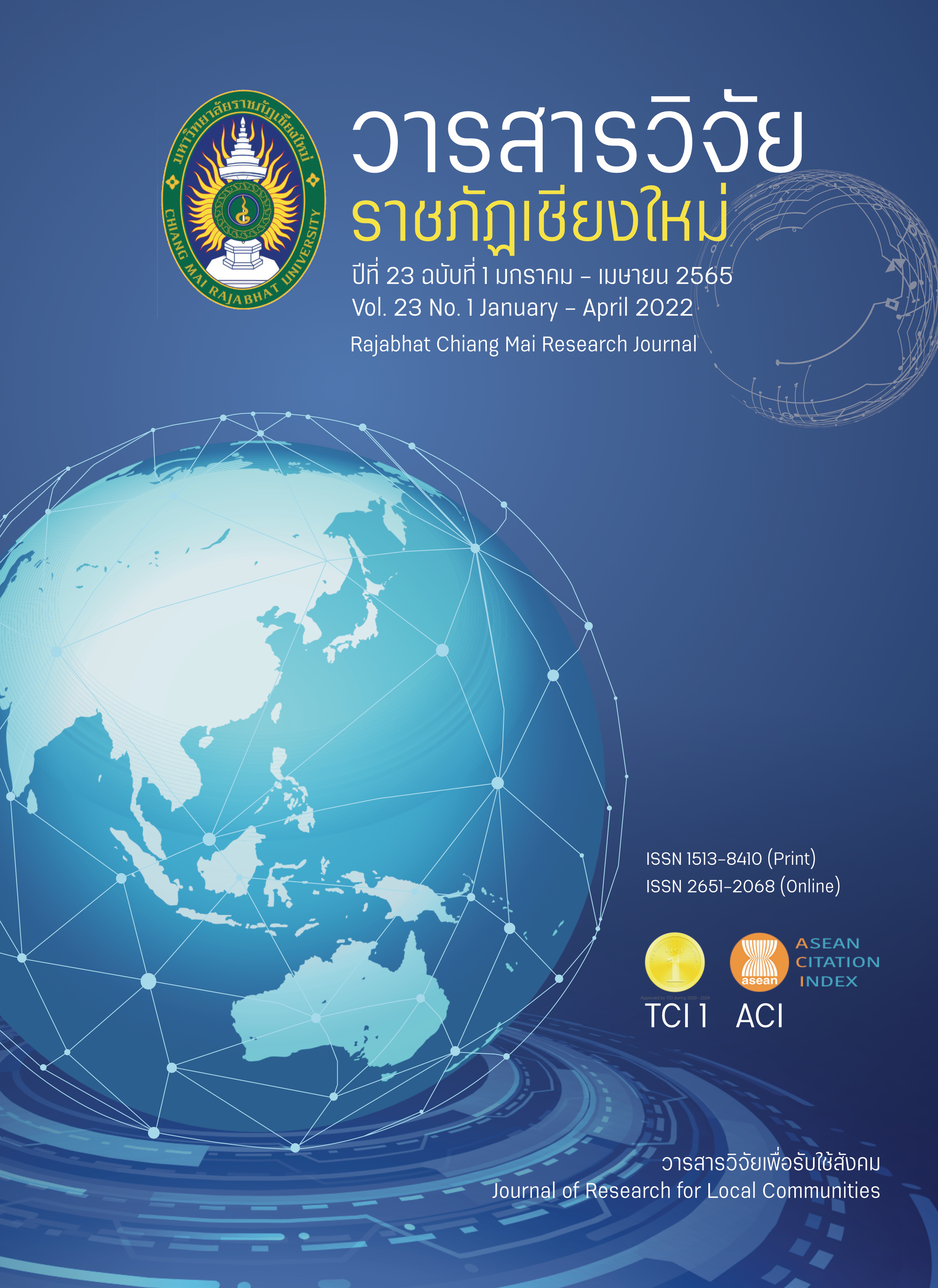การศึกษาความต้องการด้านเทคโนโลยีและนวัตกรรมที่ส่งผลต่อคุณภาพชีวิตของผู้สูงอายุในตำบลขี้เหล็กและสลวง อำเภอแม่ริม จังหวัดเชียงใหม่
DOI:
https://doi.org/10.14456/rcmrj.2022.246474คำสำคัญ:
ความต้องการ, เทคโนโลยีและนวัตกรรม, คุณภาพชีวิต, ผู้สูงอายุบทคัดย่อ
การศึกษาครั้งนี้มีวัตถุประสงค์เพื่อศึกษาความต้องการทางด้านเทคโนโลยีและนวัตกรรมที่ส่งผลต่อคุณภาพชีวิตของผู้สูงอายุและศึกษาปัจจัยที่ส่งผลต่อความต้องการทางด้านเทคโนโลยีและนวัตกรรมในผู้สูงอายุซึ่งกลุ่มตัวอย่างในการศึกษาครั้งนี้เป็นผู้สูงอายุ ในตำบลขี้เหล็กและสลวง อำเภอแม่ริม จังหวัดเชียงใหม่ จำนวน 287 คน สุ่มตัวอย่างแบบหลายขั้นตอน เครื่องมือในการวิจัยคือแบบสอบถาม สถิติที่ใช้ในการวิเคราะห์ข้อมูลได้แก่ ความถี่ ค่าร้อยละ ค่าเฉลี่ย ค่าส่วนเบี่ยงเบนมาตรฐาน และใช้ค่าสัมประสิทธิ์สหสัมพันธ์เพียร์สัน
จากการศึกษาพบว่า ผู้สูงอายุมีความต้องการทางด้านเทคโนโลยีและนวัตกรรมที่ส่งผลต่อคุณภาพชีวิตในภาพรวมอยู่ในระดับปานกลาง ด้านร่างกายและด้านสิ่งแวดล้อม ผู้สูงอายุมีความต้องการทางด้านเทคโนโลยีและนวัตกรรมที่ส่งผลต่อคุณภาพชีวิตอยู่ในระดับมาก ส่วน ด้านจิตใจ ด้านความสัมพันธ์ทางสังคมและด้านจิตวิญญาณ ผู้สูงอายุมีความต้องการทางด้านเทคโนโลยีและนวัตกรรมที่ส่งผลต่อคุณภาพชีวิตอยู่ในระดับปานกลางปัจจัยที่มีผลต่อความต้องการทางด้านเทคโนโลยีและนวัตกรรมที่ส่งผลต่อคุณภาพชีวิตของผู้สูงอายุ คือ ด้านจิตใจมีความสัมพันธ์กับปัจจัยทางด้านรายจ่าย
Downloads
เอกสารอ้างอิง
Bunphadung, S. (2011). Developing the quality of life of the elderly in the local area by using schools as a base According to the sufficiency economy principle (Phase 1), Journal of Suan Sunandha Rajabhat University, Bangkok.
Buppha, B. (2017). Factors Affecting Financial Investment of the Elderly in Sriracha Municipality, Chonburi Province, Journal of Nakhon Phanom University, 7(3), 115-125.
Cronbach, L.J. (1951). Coefficient Alpha and The Internal Structure of Tests. Psychometrik, 16(3), 297 – 334.
Demiris, D. (2009). Older adults’attitudes towards and perceptions of ‘smart home’technologies. Retrieved from https://doi.org.
Department of Provincial Administration. (2016). Statistics on the elderly of Thailand in 77 provinces. Statistics system registers the Department of Provincial Administration. (In Thai)
Ketuwongsa, P. (2016). Open a survey of Chiang Mai elderly leaders, whether they use instant messages or not and how in digital communication systems. Retrieved from www. prachatham.com. (In Thai)
Mihailidis, A. (2010). The Acceptability of Home Monitoring Technology Among Community-Dwelling Older Adults and Baby Boomers, Retrieved from https://doi.org/10.1080/10400435.2008.10131927
Nodthaisong, P. (2018). Elderly present and future. Retrieved from www.nso.go.th.
Oswald, T. & Cotton, S. (2015). Tablets can help elderly cross the ‘digital divide’. Retrieved October 26, 2015, from http://msutoday.msu.edu/news/2015/tablets-can-help- elderly-cross-the-digital-divide/
Pangputiphong, P. (2018). Year 61 Thailand, stepping into an aging society, Ministry of Public Health, Retrieved from https://www.thaihealth.or.th
Phuprasert, P. (2018). Elderly age 4.0, Digital-aware Not being deceived and violated. Retrieved from www.mediafunfacts.in.th.
Prachuapmoh, W. (2018). Aging Society 4.0 Innovation to Support Health and Life. Retrieved from www.thaihealth.or.th
Shamshad, (2017). Asia’s Older People Are Key Players in the Global Development Agenda. Retrieved from https://thediplomat.com/
Smith, A. (2014). Older adults and technology use: Adoption is increasing, but many seniors remainisolated from digital use. Retrieved from http://www.pewinternet.org/2014/04/03/older-adults-and-technology-use/
United Nations. (2018). 2018 UNIDOP Celebrates Older Human Rights Champions. Retrieved from https:// www.un.org/development/desa/ageing/international-day-of-older-persons-homepage/2018unidop.html
Vanichyanukoh, D., Anantho, S., Thongrin, S. (2017). The Process of Internet Acceptance for Developing the Quality of Life of Senior Citizens. Journal of Dhonburi Rajabhat University, 11(2), 60 – 73
Zhang, J. & Umemuro, H. (2012). Older adults’ hedonic and eudaimonic well-being in information and communication technology activities. Gerontechnology 2012, 10(4), 231-243.
ดาวน์โหลด
เผยแพร่แล้ว
รูปแบบการอ้างอิง
ฉบับ
ประเภทบทความ
สัญญาอนุญาต
ลิขสิทธิ์ (c) 2022 วารสารวิจัยราชภัฏเชียงใหม่

อนุญาตภายใต้เงื่อนไข Creative Commons Attribution-NonCommercial-NoDerivatives 4.0 International License.
1. บทความ ข้อมูล เนื้อหา รูปภาพ ฯลฯ ที่ได้รับการตีพิมพ์ใน “Community and Social Development Journal” ถือเป็นลิขสิทธิ์ของ Community and Social Development Journal มหาวิทยาลัยราชภัฏเชียงใหม่ และเพื่อให้เผยแพร่บทความได้อย่างเหมาะสมผ่านสื่อสิ่งพิมพ์และอิเล็กทรอนิกส์ ผู้เขียนยังคงถือครองลิขสิทธิ์บทความที่ตีพิมพ์ภายใต้ใบอนุญาต Creative Commons Attribution (CC BY) ซึ่งอนุญาตให้เผยแพร่บทความซ้ำในแหล่งอื่นได้ โดยอ้างอิงต้องอ้งอิงบทความในวารสาร ผู้เขียนต้องรับผิดชอบในการขออนุญาตผลิตซ้ำเนื้อหาที่มีลิขสิทธิ์จากแหล่งอื่น
2. เนื้อหาบทความที่ปรากฏในวารสารเป็นความรับผิดชอบของผู้เขียนบทความโดยตรง ซึ่งกองบรรณาธิการวารสารไม่จำเป็นต้องเห็นด้วยหรือร่วมรับผิดชอบใดๆ














